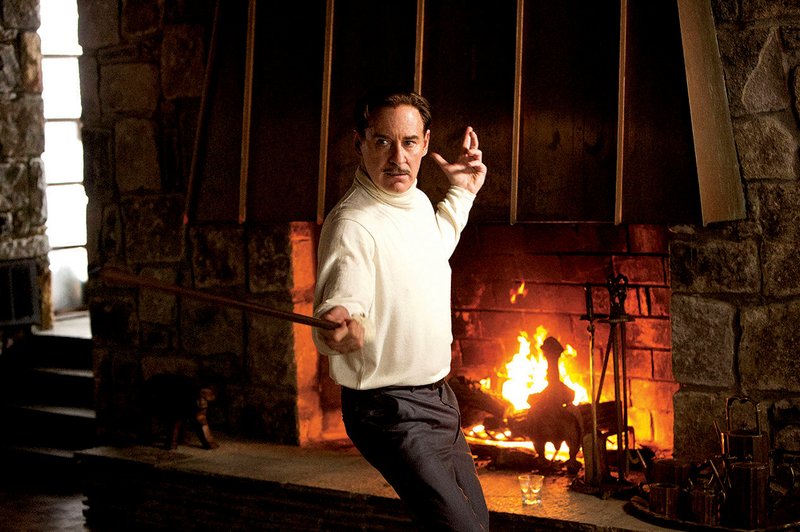The Last of Robin Hood opens in 1959 with the death of "the hero of a generation, equally known for his swashbuckling in public and in private," Errol Flynn at age 50. We quickly learn of the salacious details -- Flynn died in the arms of a "much younger girlfriend" -- via the device of a behatted radio reporter talking down his skinny microphone into his reel-to-reel tape recorder as he awaits the girl's imminent arrival at a Hollywood airport. As she disembarks, popping flash bulbs and probing questions cause the girl to swoon.
That girl, it turns out, is comely 17-year-old Beverly Aadland (Dakota Fanning), an aspiring actress who'd met the actor two years earlier when he'd spotted her in the chorus of a Gene Kelly film. Flynn arranges to meet her and immediately whisks her away to a private audition, where he proceeds to date-rape her. In his defense, Beverly makes no attempt to inform him of her tender years, and before she'd left for the studio that morning her manipulative stage mother Florence (Susan Sarandon, who never quite makes Mom a monster) had insisted she change her frock, for the one she'd chosen made her "look too young."
The Last of Robin Hood
84 Cast: Kevin Kline, Dakota Fanning, Susan Sarandon, Max Casella, Sean Flynn, Ric Reitz
Directors: Richard Glatzer, Wash Westmoreland
Rating: R, for some sexuality and language
Running time: 94 minutes
A somewhat chastened Flynn continues to pursue Beverly, with whom he is genuinely taken, and Beverly eventually warms to his advances as Florence tacitly encourages the romance. We soon come to understand that Florence is living out the show business dreams denied her through her daughter.
The film unfolds as a series of flashbacks, presumably related by Florence to Tedd Thomey (Jason Davis), with whom she wrote a memoir of her daughter's affair with Flynn.
Soon Florence is providing cover for the affair, ostensibly acting as her daughter's chaperone.
It's to the credit of the performers that what begins as a tawdry assignation evolves into a credible and rather sweet romance, as we come to believe in pitiful Flynn's passion for the (talentless) Beverly. Fanning's portrayal allows the young woman more dignity than we might expect. She is victimized but never completely a victim, and in the end it's hard to argue that her pushy mother didn't do her more harm than her charmingly vapid lover.
Flynn strives to build a career for his "protege," going so far as to insist that Stanley Kubrick cast her in Lolita if he wants to secure Flynn's services. (Kubrick resisted Flynn's offer and instead cast James Mason as Humbert Humbert and Sue Lyon as the nymphet-- we can only imagine what sort of film he might have made had he acquiesced to Flynn's ultimatum.) Eventually Flynn managed to finagle Beverly a role in what turned out to be his last film, the embarrassing Cuban Rebel Girls, a quasi-documentary about the pre-communistic Fidel Castro written and narrated by Flynn.
While the performances make it watchable, there's something cringe-worthy in this story of a silly older man's last conquest -- the writer-directors Richard Glatzer and Wash Westmoreland seem a little too willing to give the predatory Flynn a pass. Instead they co-opted the prevailing attitudes of the period, stressing the transactional nature of the relationship and the genuine affection at the heart of the romance. Modern audiences are likely to find it a little difficult to believe that the relationship wasn't more coercive than what's depicted on screen. There's a part of The Last of Robin Hood that feels like an exculpatory fairy tale.
MovieStyle on 09/19/2014
